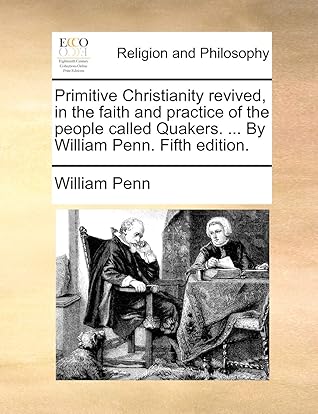- Bible
- Read the Bible
- Bible Versions
- Verse of the Day
- Reading Plans
- Verses by Topic
- Books of the Bible
- Bible Images
- Study
- Commentaries
- Concordances
- Dictionaries
- Encyclopedias
- Sermons
- Bible Atlas & Maps
- BP Wiki
- Devotionals
- Today's Devotionals
- Light of the World
- All Devotionals
- Inspirational Quotes
- More
- Picture Quotes
- Videos
- Inspirational
- Bible Study
- What The Bible Says
- Bible Q&As
- Daily Bread
- Bible by Genre
- Bible Stories
- Random Bible Verse
- Community
- Store
Primitive Christianity Revived, in the Faith and Practice of the People Called Quakers. ... by William Penn. Fifth Edition.
by William Penn
The 18th century was a wealth of knowledge, exploration and rapidly growing technology and expanding record-keeping made possible by advances in the printing press. In its determination to preserve the century of revolution, Gale initiated a revolution of its own: digitization of epic proportions to preserve these invaluable works in the largest archive of its kind. Now for the first time these high-quality digital copies of original 18th century manuscripts are available in print, making them highly accessible to libraries, undergraduate students, and independent scholars.
The Age of Enlightenment profoundly enriched religious and philosophical understanding and continues to influence present-day thinking. Works collected here include masterpieces by David Hume, Immanuel Kant, and Jean-Jacques Rousseau, as well as religious sermons and moral debates on the issues of the day, such as the slave trade. The Age of Reason saw conflict between Protestantism and Catholicism transformed into one between faith and logic -- a debate that continues in the twenty-first century.
++++
The below data was compiled from various identification fields in the bibliographic record of this title. This data is provided as an additional tool in helping to insure edition identification:
++++
British Library
T087156
With a final leaf of advertisements.
London: printed and sold by James Phillips, 1796. viii,77, [3]p.; 8
BUY NOW
Paperback, 94 pages
Published June 24th 2010 by Gale Ecco, Print Editions
© 2025 Bibleportal.com All rights reserved.

William Penn was an English founder and "Absolute Proprietor" of the Province of Pennsylvania, the English North American colony and the future U.S. State of Pennsylvania. He was known as an early champion of democracy and religious freedom and famous for his good relations and his treaties with the Lenape Indians. Under his direction, Philadelphia was planned and developed.
As one of the earlier supporters of colonial unification, Penn wrote and urged for a Union of all the English colonies in what was to become the United States of America. The democratic principles that he set forth in the Pennsylvania Frame(s) of Government served as an inspiration for the United States Constitution. As a pacifist Quaker, Penn considered the problems of war and peace deeply, and included a plan for a United States of Europe, "European Dyet, Parliament or Estates," in his voluminous writings.
... Show more